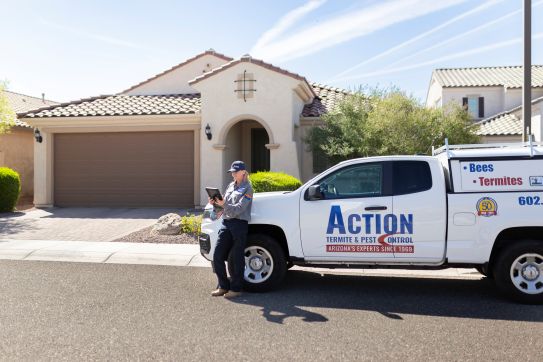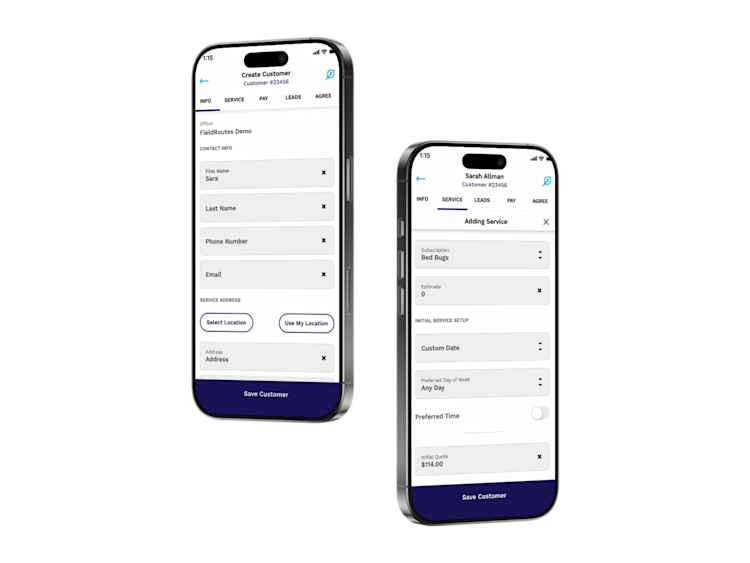Lawn Care Business License Guide By State (Updated as of 2024)

If you plan to start a lawn care business, there are plenty of opportunities to make money and expand your business.
According to Grand View Research, experts predict landscaping services will grow at a 6.4% growth rate by 2030.
Starting a business involves fulfilling legal requirements and completing applications. Obtain the proper lawn care licenses to establish a business legally, demonstrate professionalism, and build customer trust.
While lawn care licensing requirements vary by state, most states require business owners to register their lawn care or landscaping business and many require landscaping contractors to hold professional licenses.
Follow these steps to meet your state’s licensing requirements, deliver safe and effective service to your customers, and set up your business for success.
Why Do I Need a License for My Lawn Care Business?
Many states require licenses for landscaping contractors or landscaping businesses performing certain types of work, such as applying fertilizer or pesticides. Many localities require businesses to obtain occupational licenses to operate legally.
Check the licensing requirements in the states, cities, and counties where you plan to perform lawn care services.
Lawn care licensing provides:
Legal compliance: Follow licensing procedures to comply with governmental regulations.
Competitive advantage: Licensing proves your business operates professionally and gives you an advantage over competitors.
Customer confidence: Licensure gives customers the assurance your company operates professionally.
Increased sales: Commercial clients seek companies with licensing and industry knowledge.
Obtaining the right licenses requires research and work, but failing to comply with regulations can result in legal troubles, business penalties, and revenue loss.
How Long Does it Take to Get a Lawn Care License?
The length of time to get a lawn care license depends on the type of license and the state where you work.
Some states require experience, completion of educational courses, or an examination before receiving a license.
If the state or locality doesn’t mandate any prerequisite requirements, it may just take a few days to obtain a business license for your lawn mowing business.
How Much Does it Cost to Get a Lawn Care License?
In most cases, it’s relatively affordable to obtain a lawn care business license. Many states charge only a minimal fee to register a business.
Some occupational licenses, such as a landscape contractor license, cost more and come with additional requirements, such as education, insurance, and bonds.
What are the Benefits of Getting a Lawn Care License?
Obtaining a lawn care license ensures your company operates legally in the states where you perform work, and protects your company and customers.
A lawn care license provides many other benefits, including:
Proves experience and skill: Licensing shows customers you’ve met professional requirements, which builds credibility and trust.
Gives a competitive advantage: Licensing helps your company stand out and shows your commitment to quality service.
Increases earning potential: As a licensed business, it allows you to charge higher rates and attract higher-paying clients.
Expands networking opportunities: Meet other licensed professionals in the industry at trade events.
Creates a marketing edge: Licensing establishes your brand and attracts new customers.
In addition to business licensing, consider earning industry credentials and certifications to demonstrate your expertise and solidify business growth.
What are the Essential Steps to Get a Lawn Care License?
You’ll need to create a lawn care business before filing for a license. This typically includes registering your business with the state and fulfilling legal requirements.
Each state sets its own requirements, so check with the appropriate agencies to ensure you begin your business properly.
Follow these steps to get your lawn maintenance business up and running.
1. Establish Your Business Foundation
To form your lawn care business, first create a business plan. This important document outlines the legal structure of your business, defines your purpose and target market, and identifies marketing and pricing strategies.
It’s an essential step if you plan to seek loans or start-up funding for your small business. Consult a business lawyer or tax professional to guide you through the process.
Choose a business structure
A business structure provides the legal framework for a business. Each business structure has its own tax requirements and protects a business owner’s assets in different ways.
Common structures include:
Sole proprietorship: Although it’s the easiest structure to set up and requires the least amount of paperwork, it offers no liability protection and increases an owner’s financial risk.
Limited Liability Company (LLC): An LLC forms a separate business entity, so it protects an owner’s personal assets and gives options for how you pay taxes.
Partnership: Limited partnerships and limited liability partnerships work for those with multiple business partners. Each type offers different liability benefits.
Register your business
Choose a name that reflects your business and register your business with the state. Typically, businesses register with the Secretary of State, but many states require you to register with additional agencies for taxes and workers’ compensation.
You’ll likely need to register in every state where you do business. Check with cities and counties where you plan to perform work, as some require business permits or occupational licenses.
File for tax identification
Most businesses need to apply for an employer identification number (EIN), a number assigned by the IRS for tax purposes. It’s free and businesses receive an EIN immediately after applying.
Businesses also need to apply for a state tax identification number with the appropriate state agency, depending on the state’s rules.
2. Fulfill the Licensing Requirements
Licensing requirements vary based on state and local regulations. Even if a state doesn’t require licensing, cities and counties may require business owners to obtain a license or permit to operate.
Licensing requirements could include:
A certain number of years of experience or educational courses
Examinations to prove your knowledge in the field
General liability insurance to protect your company and customers
Workers’ compensation insurance, depending on state requirements
Surety bonds as a guarantee your business complies with regulations
3. Submit Your License Application
Once you know which agencies require licensing in your city or state, find out how to submit the licensing application.
The application process typically includes:
Gather legal information: This includes providing your EIN number, proof of training completion, exam results, insurance certificates, proof of bond, and other required documentation.
Complete the application: Complete the application online or by mail.
Pay licensing fee: Most licensing or permits require a fee when you submit the application.
Await approval: Once a licensing agency reviews and processes your application, they’ll notify you of approval. This could take several weeks.
Additional Tips
The most successful lawn care and landscaping service businesses implement strategies to improve service and expand their customer base.
Consider these strategies to gain an advantage:
Use lawn care business software: Cloud-based software, such as FieldRoutes, provides digital tools to work efficiently, improve customer service, and grow profit.
Network with professionals: Attend local or industry networking events to meet other business owners and expand your customer base.
Stay up-to-date on regulations: Stay informed about industry best practices, laws, and other requirements to stay compliant and deliver top-quality service.
How to Get a Lawn Care Business License: State-by-State
Each state possesses different requirements for lawn care licensing. Check requirements before performing work to ensure compliance.
If your lawn care business performs specialty services, you may need additional licensing or certification.
Those applying restricted use pesticides must obtain certification in accordance with the U.S. Environmental Protection Agency regulations and state laws. Some states also require certification for fertilizer applicators.
Below, find an overview of lawn care licensing processes and requirements in your state.
Alabama
Business registration
In Alabama, business entities register with the Alabama Secretary of State. Sole proprietorships do not need to register with the Secretary of State, but need to confirm the availability of a trade name, if applicable. All businesses register with the Alabama Department of Revenue and should check with cities and counties where they plan to perform work.
Lawn care licensing
The Alabama Department of Agriculture and Industries issues horticulture professional services licenses for businesses providing the following services:
Landscape design (LD)
Tree surgery (TS)
Setting of landscape plants (SLP)
Ornamental & Turf Pest Control (OTPS)
To obtain these licenses, the state requires a certified operator to pass an exam and submit their commercial applicators license application.
Alaska
Business licensing
In Alaska, businesses register with the Alaska Department of Commerce, Community, and Economic Development.
Lawn care licensing
The Alaska Division of Corporations, Business and Professional Licensing issues specialty contractor licenses for various trades. A landscaping contractor trade designation covers these services:
Grading, filling, and leveling ground
Hauling fill, gravel, topsoil, sand, and similar construction materials
Constructing water drainage systems, dewatering, and ponds
Hydro-seeding
Planting grass, shrubbery, trees, and ornamental or decorative plants
Arizona
Business licensing
In Arizona, direct customer service activities, such as lawn maintenance, do not typically need a state license. The state recommends businesses register a trade name with the Arizona Secretary of State. Arizona provides an online business registration portal.
Depending on the services, some businesses need to obtain a state transaction privilege tax (TPT) license with the Arizona Department of Revenue. Cities and towns may also require business licenses for businesses based within their jurisdiction or conducting business within its limits.
Lawn care licensing
The Arizona Registrar of Contractors (ROC) licenses contractors, including landscaping contractors who perform certain types of construction work. The state requires a contractor license for any work totaling $1,000 or more for labor and materials, or if a building permit is required. This includes some landscaping work, such as installing or removing landscaping or sprinkler systems.
Arkansas
Business licensing
In Arkansas, business owners register entities with the Arkansas Secretary of State. In addition, most cities require businesses operating within city limits to obtain a business permit.
Lawn care licensing
Landscaping contractors who install ornamental or horticultural plants obtain a license from the Arkansas Department of Agriculture. The department also issues pesticide licenses.
California
Business licensing
In California, business owners register entities with the California Secretary of State. Most cities require companies doing business within city limits to apply for a business permit/business tax certificate. The Governor’s Office of Business and Economic Development provides a website to look up city and county permitting requirements.
Lawn care licensing
The Department of Consumer Affairs Contractors State License Board licenses landscape contractors (C-27). The California Department of Pesticide Regulation issues pesticide licenses.
Colorado
Business licensing
In Colorado, businesses register with the Colorado Secretary of State and apply for a state tax number with the Colorado Department of Revenue. Colorado provides an online business registration portal. Permitting requirements vary in Colorado cities. Some cities require permits for all businesses, while others only issue business permits for certain types of services, such as tree services.
Lawn care licensing
The Colorado Department of Agriculture issues pesticide licenses.
Connecticut
Business licensing
In Connecticut, businesses register with the Connecticut Secretary of State and the Connecticut Department of Revenue.
Lawn care licensing
Connecticut regulates landscape architects but does not issue licenses to lawn care or landscape contractors, unless they perform work in the irrigation trade. The Connecticut Department of Energy and Environmental Protection issues pesticide certifications.
Delaware
Business licensing
In Delaware, business owners obtain a business license from the Delaware Division of Revenue. Delaware provides an online business registration portal. Check with counties, cities, and towns to see if localities require permits to conduct business.
Lawn care licensing
Delaware licenses landscape architects but does not issue licenses for lawn care or landscape contractors. Those who apply fertilizers must obtain a nutrient management certification from the Delaware Department of Agriculture. Businesses using general use or restricted use pesticides must obtain a pesticide business license from the Department of Agriculture.
Florida
Business licensing
In Florida, businesses register with the Florida Department of State. Most businesses also need to register with the Florida Department of Revenue. Florida cities and counties also may require businesses to obtain business tax receipts.
Lawn care licensing
Florida does not license landscape contractors but the Florida Department of Agriculture and Consumer Services provides limited commercial landscape maintenance applicator certifications for lawn care professionals applying pesticides to ornamental plants and plant beds.
Georgia
Business licensing
In Georgia, business owners register business entities with the Georgia Secretary of State. Businesses also may need to register with the Georgia Department of Revenue. Counties and cities may also require business licenses and permits.
Lawn care licensing
The Georgia Department of Agriculture issues live plant licenses for landscapers selling plants. It also issues pesticide applicator and pesticide contractor licenses. Those who buy, use, or supervise restricted-use pesticides or charge a fee for general use or restricted-use pesticides applications need an applicator license.
Hawaii
Business licensing
In Hawaii, business owners register a business with the Department of Commerce and Consumer Affairs. Businesses also register with the Department of Taxation.
Lawn care licensing
The Department of Commerce and Consumer Affairs Professional and Vocational Licensing Division licenses contractors, including a landscaping contracting specialty. The division issues C-27 landscaping contractor and C-27b tree trimming and removal contractor licenses.
Idaho
Business licensing
In Idaho, businesses register with the Idaho Secretary of State. Businesses with employees also register with the Idaho State Tax Commission, the Idaho Industrial Commission, and the Idaho Department of Labor. Some Idaho cities issue business licenses.
Lawn care licensing
Idaho requires those engaging in construction jobs with a value of more than $2,000 in labor and materials to register as a contractor with the Division of Occupational and Professional Licenses Contractors Board. Those who install landscape plants must hold a license from the Idaho State Department of Agriculture.
Illinois
Business licensing
In Illinois, owners of LLCs, corporations, and S corporations register with the Illinois Secretary of State. All businesses need to register with the Illinois Department of Revenue.
Lawn care licensing
Illinois does not issue a statewide landscaping contractor license. Many cities require businesses, including landscaping maintenance businesses, to obtain a license to work within city limits. The Illinois Department of Agriculture requires applicator licenses for those who buy or apply restricted-use pesticides.
Indiana
Business licensing
In Indiana, business owners register with the Indiana Secretary of State. Businesses meeting certain requirements also register with the Indiana Department of Revenue. Indiana provides an online business registration portal.
Lawn care licensing
Indiana requires commercial lawn care professionals applying fertilizers to obtain a pesticide business license from the Office of Indiana State Chemist. Categories include 3a ornamental pest management and 3b turf management.
Iowa
Business licensing
In Iowa, business owners register business entities with the Iowa Secretary of State. Businesses also register with the Iowa Department of Revenue. Some Iowa cities issue general business permits, while others only license certain types of businesses.
Lawn care licensing
The Iowa Department of Agriculture and Land Stewardship issues pesticide applicator and commercial fertilizer licenses.
Kansas
Business licensing
In Kansas, business owners register business LLCs and corporations with the Kansas Secretary of State. Business owners also register with the Kansas Department of Revenue. Kansas provides an online business registration portal. Check with cities and counties to determine local business permitting requirements.
Lawn care licensing
The Kansas Department of Agriculture issues pesticide business licenses and pesticide applicator licenses.
Kentucky
Business licensing
In Kentucky, business owners register a business entity with the Kentucky Secretary of State. Register with the Kentucky Business OneStop portal to register for tax accounts and obtain a Commonwealth Business Identifier, a unique number assigned to all Kentucky businesses. Businesses also should check with cities and counties for local business licenses or occupational tax requirements.
Lawn care licensing
The Kentucky Department of Agriculture licenses commercial and non-commercial application of pesticides and fertilizers.
Louisiana
Business licensing
In Louisiana, business entities register with the Louisiana Secretary of State. Businesses also register with the Louisiana Department of Revenue. In addition, many cities require a general business license, or occupational license, to conduct business within city limits.
Lawn care licensing
The Louisiana Department of Agriculture and Forestry issues landscape horticulturist licenses, landscape irrigation contractor licenses, arborist licenses, and commercial pesticide licenses.
Maine
Business licensing
In Maine, business owners who incorporate or form a limited partnership or a limited liability company register with the Maine Secretary of State. Businesses also register with Maine Revenue Services. Maine cities and towns issue business licenses.
Lawn care licensing
The Board of Pesticides Control within the Maine Department of Agriculture, Conservation, and Forestry issues pesticide applicator licenses.
Maryland
Business licensing
All businesses register with the Maryland Department of Assessments and Taxation. Maryland provides an online business registration portal. After registering, business owners obtain state business licenses from the Clerks of the Circuit Court in the jurisdiction of the company’s location, depending on the type of services.
Lawn care licensing
The Maryland Home Improvement Commission issues licenses to landscape contractors. The Maryland Department of Natural Resources licenses tree care professionals. In addition, the Maryland Department of Agriculture provides pesticide business licensing and pesticide applicator certification. The department also certifies businesses and individuals who fertilize turf.
Massachusetts
Business licensing
In Massachusetts, business owners file with the Secretary of Commonwealth and register with the Massachusetts Department of Revenue. Business owners also apply for a business certificate in the city or town of the company��’s location.
Lawn care licensing
The Massachusetts Department of Agriculture Resources issues pesticide applicator licenses for those using restricted-use pesticides.
Michigan
Business licensing
In Michigan, business owners register businesses with the Department of Treasury. The state issues permits for certain types of business activities. Some localities also require certain business licenses.
Lawn care licensing
The Michigan Department of Agriculture and Rural Development issues pesticide business licenses and pesticide applicator certification.
Minnesota
Business licensing
In Minnesota, business owners register with the Minnesota Secretary of State and the Minnesota Department of Revenue.
Lawn care licensing
The state requires landscape contractors to keep a certified landscape specialist on the project site at all times to perform or supervise plant installation and establishment. The Minnesota Department of Transportation issues landscape specialist certifications. The state also requires fertilizer licenses and pesticide licenses from the Minnesota Department of Agriculture.
Mississippi
Business licensing
In Mississippi, business owners register with the Mississippi Secretary of State and the Mississippi Department of Revenue.
Lawn care licensing
Mississippi requires licenses for those engaged in landscaping services or setting or replacing plants. The Mississippi Department of Agriculture and Commerce issues landscape horticulturist licenses and pesticide applicator licenses.
Missouri
Business licensing
In Missouri, business owners register businesses with the Missouri Secretary of State and the Missouri Department of Revenue. Most cities require businesses to obtain a business permit where they perform services.
Lawn care licensing
Missouri does not issue landscaping contractor licenses. The Missouri Department of Agriculture issues pesticide licenses.
Montana
Business licensing
In Montana, businesses register with the Montana Secretary of State and the Montana Department of Revenue. Montana cities and counties also issue business licenses.
Lawn care licensing
The Montana Department of Agriculture issues pesticide applicator licenses for those using or supervising pesticides to control pests in the maintenance and production of ornamental trees, shrubs, flowers, and turf.
Nebraska
Business licensing
In Nebraska, businesses file with the Nebraska Secretary of State and the Nebraska Department of Revenue. Nebraska provides a one-stop online portal for business registration.
Lawn care licensing
The state requires contractors performing work on another’s property to register with the Nebraska Department of Labor. This includes landscaping services, such as lawn care and tree trimming. The Nebraska Department of Agriculture issues pesticide licenses.
Nevada
Business licensing
In Nevada, business owners register with the Nevada Secretary of State and the Nevada Department of Taxation. Business owners must also obtain a permit in the city or county of operation.
Lawn care licensing
The Nevada State Contractors Board issues landscape contracting licenses, a C-10 classification. The Nevada Department of Agriculture issues pesticide applicator licenses.
New Hampshire
Business licensing
In New Hampshire, business entities register with the New Hampshire Secretary of State. Certain businesses apply for a tax operator’s license with the New Hampshire Department of Revenue Administration. Requirements vary for New Hampshire cities. Some require permits to operate while others require permits for certain types of businesses.
Lawn care licensing
The New Hampshire Department of Agriculture, Markets and Food issues licenses for pesticide applicators, which includes pesticides for shade and ornamental and turf applications.
New Jersey
Business licensing
In New Jersey, business owners register with the New Jersey Division of Revenue and Enterprise Services. Sole proprietors and partnerships register their trade names with their county. Some New Jersey cities require permits for businesses to operate, while others require permits for certain types of businesses.
Lawn care licensing
The New Jersey Division of Consumer Affairs issues home improvement contractor licenses, which includes construction, installation, replacement, improvement, or repair of landscaping. The New Jersey Department of Environmental Protection Bureau of Pesticide Control issues pesticide applicator licenses. The Department of Community Affairs Board of Landscape Irrigation Contractors issues landscape irrigation contractor business permits.
New Mexico
Business licensing
In New Mexico, business owners register with the New Mexico Secretary of State and the New Mexico Taxation and Revenue Department. New Mexico cities and counties require business owners to register where they operate.
Lawn care licensing
The New Mexico Department of Agriculture issues pesticide licenses.
New York
Business licensing
In New York, business owners register business entities with the New York Department of State. Business owners also file with the New York State Department of Taxation and Finance. Cities in New York require business licenses for certain types of businesses.
Lawn care licensing
The New York State Department of Environmental Conservation Bureau of Pesticides Management certifies pesticide applicators.
North Carolina
Business licensing
In North Carolina, business entities file with the North Carolina Secretary of State and the North Carolina Department of Revenue.
Lawn care licensing
The North Carolina Landscape Contractors’ Licensing Board licenses landscape contractors. The North Carolina Department of Agriculture and Consumer Services issues pesticide applicator licenses.
North Dakota
Business licensing
In North Dakota, business owners register businesses with the North Dakota Secretary of State and the North Dakota Office of the State Tax Commissioner. Some North Dakota cities require business licenses for certain types of businesses, such as tree contractors.
Lawn care licensing
North Dakota does not issue landscaping contracting licenses but provides certification programs for pesticide applicators.
Ohio
Business licensing
In Ohio, business owners register with the Ohio Secretary of State and the Ohio Department of Taxation. Some Ohio cities and villages issue permits for certain types of businesses, such as landscaping and snow removal contractors.
Lawn care licensing
The Ohio Department of Agriculture issues pesticide applicator licenses.
Oklahoma
Business licensing
In Oklahoma, business owners register with the Oklahoma Secretary of State. Businesses selling products also register with the Oklahoma Tax Commission. Counties, towns and cities may require local licenses.
Lawn care licensing
The Oklahoma Department of Agriculture, Food and Forestry issues pesticide licenses and fertilizer licenses for ornamental and turf application.
Oregon
Business licensing
In Oregon, business owners register with the Oregon Secretary of State. Many cities also require businesses to obtain permits for certain services.
Lawn care licensing
Oregon requires landscaping businesses to obtain a landscape contracting business license. The state issues several types of individual landscape construction professional licenses, including a standard landscaping construction license without irrigation, irrigation only, all phase plus backflow, and a modified license that limits scope of work and job size. The Oregon Department of Agriculture issues pesticide business and applicator licenses.
Pennsylvania
Business licensing
In Pennsylvania, business owners register with the Pennsylvania Department of State and the Pennsylvania Department of Revenue. Some Pennsylvania cities require business licenses for operating in city limits, while others require permits for certain types of businesses. The state offers a one-stop online business registration.
Lawn care licensing
Landscape contractors performing specific residential construction work obtain a home improvement contractor license with the Pennsylvania Office of Attorney General. The Pennsylvania Department of Agriculture issues pesticide licenses.
Rhode Island
Business licensing
In Rhode Island, business owners register with the Rhode Island Department of State and the Rhode Island Department of Revenue Division of Taxation.
Lawn care licensing
The State of Rhode Island Department of Labor and Training licenses irrigation professionals. The Department of Environmental Management issues pesticide applicator licenses.
South Carolina
Business licensing
In South Carolina, business owners register with the South Carolina Secretary of State and the South Carolina Department of Revenue. South Carolina counties and cities also issue business licenses.
Lawn care licensing
The South Carolina Department of Pesticide Regulation issues pesticide licenses for those using pesticides as part of a job or for compensation.
South Dakota
Business licensing
In South Dakota, business owners register businesses with the South Dakota Secretary of State and the South Dakota Department of Revenue. Cities require certain business licenses based on the type of business.
Lawn care licensing
The South Dakota Department of Agriculture and Natural Resources issues pesticide applicator licenses.
Tennessee
Business licensing
In Tennessee, business owners register with the Tennessee Secretary of State and the Tennessee Department of Revenue. Tennessee counties and cities also issue business licenses.
Lawn care licensing
Tennessee Board for Licensing Contractors licenses landscaping contractors (BC-29). The Tennessee Department of Agriculture licenses pesticide applicators, including those who apply pesticides to lawns, turf, trees, and shrubs.
Texas
Business licensing
In Texas, business owners register with the Texas Secretary of State. Sole proprietorships register with the local county clerk’s office. Business owners also register with the Texas Comptroller. Some cities and counties issue general business licenses while others issue licenses based on the type of service.
Lawn care licensing
The Texas Commission on Environmental Quality licenses landscape irrigators. The Texas Department of Agriculture issues pesticide applicator licenses.
Utah
Business licensing
In Utah, business owners register businesses with the Utah Department of Commerce and the Utah State Tax Commission. The state offers a one-stop online business registration portal. Cities and counties also issue business licenses.
Lawn care licensing
The Utah Department of Commerce Division of Professional Licensing issues landscaping and recreation contractor licenses (S-330). The Utah Department of Agriculture and Food issues pesticide applicator licenses.
Vermont
Business licensing
In Vermont, business owners register with the Vermont Secretary of State and the Vermont Department of Taxes.
Lawn care licensing
The State of Vermont Agency of Agriculture Food and Markets issues pesticide applicator licenses. The state also issues custom applicator licenses for those applying land nutrients.
Virginia
Business licensing
In Virginia, businesses file through the State Corporation Commission Clerk’s Information System. Cities and counties also issue business licenses.
Lawn care licensing
Landscaping contractors involved in construction, removal, repair, or improvement need a contractor’s license from the Department of Professional Occupational Regulation Board for Contractors. The Virginia Department of Agriculture and Consumer Services issues pesticide applicator licenses.
Washington
Business licensing
In Washington, businesses register with the Washington Secretary of State and the Washington State Department of Revenue. Cities and counties also issue business licenses.
Lawn care licensing
The Washington State Department of Labor and Industries issues contractor licenses, including licenses for the specialty classifications of landscaping, tree removal, irrigation sprinkler systems, and excavation, grading, and land clearing. The Washington State Department of Agriculture issues pesticide licenses.
West Virginia
Business licensing
In West Virginia, business owners register with the West Virginia Secretary of State and the West Virginia Department of Revenue. The state provides a one-stop online business portal for registration. Cities and counties also license businesses.
Lawn care licensing
The West Virginia Department of Agriculture issues pesticide applicator licenses.
Wisconsin
Business licensing
In Wisconsin, business owners register with the Wisconsin Secretary of State and the Wisconsin Department of Revenue. The state issues a one-stop online business portal for registration. Wisconsin cities also issue business licenses.
Lawn care licensing
The State of Wisconsin Department of Agriculture, Trade and Consumer Protection issues pesticide certification and licensing.
Wyoming
Business licensing
In Wyoming, business owners register with the Wyoming Secretary of State and the Wyoming Department of Revenue. Many Wyoming cities issue business licenses based on the type of business.
Lawn care licensing
The Wyoming Department of Agriculture issues pesticide applicator licenses.
Ready to Get Certified and Grow Your Business?
While lawn care licensing remains an essential first step, it’s crucial to create a solid plan to run and grow your business successfully.
FieldRoutes® Operations Suite empowers lawn care businesses to streamline workflows for daily tasks, including:
Dynamic scheduling with automated notifications
Intelligent routing to optimize drive time and minimize fuel costs
A mobile app to boost on-site sales and connect crews
Automated payments to streamline invoicing and increase cash flow
Industry-specific tools improve customer service, increase sales, and enhance marketing, driving productivity and profitable growth.
Ready to start your business off right? Schedule a free demo to find out more.





